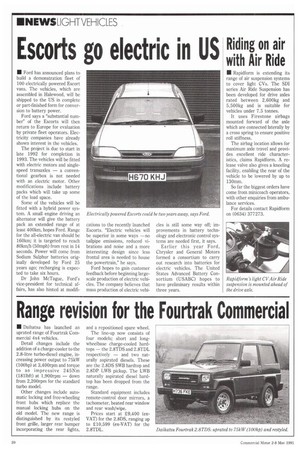• Ford has announced plans to build a demonstration fleet
Page 22

If you've noticed an error in this article please click here to report it so we can fix it.
of 100 electrically powered Escort vans. The vehicles, which are assembled in Halewood, will be shipped to the US in complete or part-finished form for conversion to battery power.
Ford says a "substantial number" of the Escorts will then return to Europe for evaluation by private fleet operators. Electricity companies have already shown interest in the vehicles.
The project is due to start in late 1992 for completion in 1993. The vehicles will be fitted with electric motors and singlespeed transaxles — a conventional gearbox is not needed with an electric motor. Other modifications include battery packs which will take up some of the load space.
Some of the vehicles will be fitted with a hybrid power system. A small engine driving an alternator will give the battery pack an extended range of at least 400km, hopes Ford. Range for the all-electric van should be 160km; it is targeted to reach 80km/h (50mph) from rest in 14 seconds. Power will come from Sodium Sulphur batteries originally developed by Ford 25 years ago; recharging is expected to take six hours.
Dr John McTague, Ford's vice-president for technical affairs, has also hinted at modifi cations to the recently launched Escorts. "Electric vehicles will be superior in some ways —no tailpipe emissions, reduced vibrations and noise and a more interesting design since less frontal area is needed to house the powertrain," he says.
Ford hopes to gain customer feedback before beginning largescale production of electric vehicles. The company believes that mass production of electric vehi cies is still some way off; improvements in battery technology and electronic control systems are needed first, it says.
Earlier this year Ford, Chrysler and General Motors formed a consortium to carry out research into batteries for electric vehicles. The United States Advanced Battery Consortium (USABC) hopes to have preliminary results within three years.




















































































